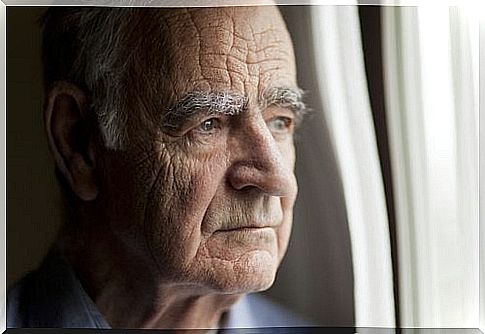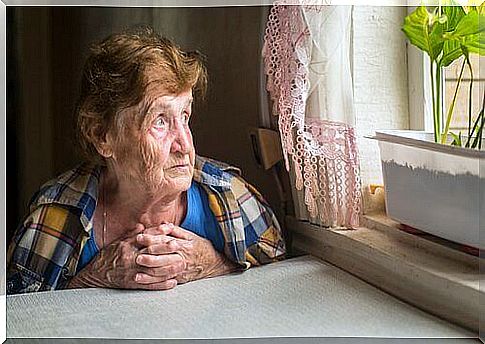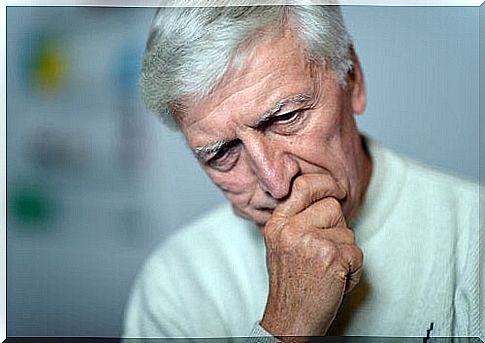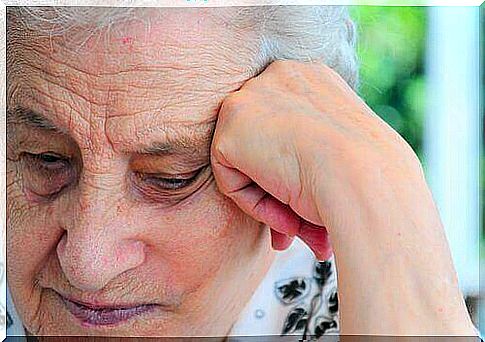Depression In The Elderly: How To Recognize It In Time

After reaching a certain age and retiring, some older people may start to show symptoms of depression because they feel as if they are no longer useful in society.
In these cases, it is important that the loved ones of these people help them see that their lives are not over yet. And convince them that there is still plenty for them to experience.
Sadness and frustration can drastically change the daily lives of older people. That is why we tell you in this article how you can recognize a mental disorder such as depression in good time.
Depression in the elderly: what you need to know

After they retire, a lot of people simply feel useless. They feel as if their lives no longer have any meaning.
These kinds of thoughts can make them depressed, making them absolutely unable to enjoy the years they have ahead of them. Which can be ten, fifteen or sometimes even more than twenty.
Unfortunately, depression in the elderly is very common. Even despite the fact that depression is not a natural part of the aging process at all.
- Depression in the elderly can be related to all the changes that have occurred in the last years of their lives.
- It may also have to do with whether or not they have received recognition for everything they have accomplished in their lives.
- However, it can also depend on the contact they have with their family and whether or not they have enough things to occupy themselves with.
Lifestyle changes
The changes that occur in the lifestyle of older people after they reach their 60s are of great importance.
For example, for the past thirty to forty years, these people simply went to work, week in week out, from Monday to Friday. Their days were filled. Since they have retired, they wake up every morning not knowing what to do with themselves.
Some situations can cause a person to develop more severe depression. Situations like:
- Having to leave their family home (to downsize or move in with their children)
- Going to a retirement home
- Chronic aches and serious illnesses
- The death of their partner, siblings or close friends
- Losing their independence
- The lack of obligations
- having little to do
- Financial problems (different from the lifestyle they are used to)
Old-age depression is not always noticed by this person’s loved ones. They underestimate the symptoms and often think they are temporary or just part of getting older.
However, when the elderly suffer from these kinds of negative emotions for a very long time, another problem can arise. They may also show physical symptoms. Sometimes depressed elderly people can even choose to stop eating or to end their lives.
In addition, it is important to know that the diagnosis of a new disease can also be a reason for older people to become depressed. This happens, for example, when they are diagnosed with cancer, Parkinson’s, dementia, etc.
In addition, the condition of these diseases can worsen if they also take certain drugs, such as sleeping pills.
Drinking too much alcohol can also affect these types of illnesses.
How do you recognize depression in the elderly?

As adults, we often think about what it will be like to retire and have a head full of gray hair. Perhaps in this vision of the future you see a lot of love in your life, a beautiful house on the beach or in a small village somewhere.
Perhaps you can already picture yourself sitting in that rocking chair with a newspaper between your fingers and assume that your children and grandchildren will visit you regularly.
Unfortunately, reality does not always match this fantasy image.
You may have to go to a retirement home after you retire because your family cannot take care of you. Your partner may have already died or been diagnosed with a serious illness. In addition, you may experience so much physical pain that you can barely leave the house, let alone do all kinds of things.
The final stages of the aging process are for many the worst stages in their lives.
There are all kinds of serious changes in these phases that are difficult for many to accept. These are changes such as the loss of a loved one, the feeling of being inferior or unprotected and even the sudden inability to contribute to society.
That is why depression is so common in the elderly.
However, the children, grandchildren, and cousins of these people are the individuals who would best recognize the early symptoms of this mental condition. They can also help their loved one realize that his life is far from over. And that there is still a lot to experience.
First symptoms

In the early stages of depression in the elderly, all kinds of symptoms appear. Some of them are:
- sadness
- Lack of exercise that lasts for at least a while (sometimes even weeks)
- Not interested in things they used to love
- Lack of satisfaction or pleasure in performing daily activities
In contrast, this person may also experience symptoms such as:
- Fatigue, more than usual. This is experienced even when he has not exerted himself physically.
- Lack of appetite (and resulting weight loss).
- The urge to isolate oneself from the people around them.
- Sleep problems (elderly sleep less than adults: an average of four to six hours a night).
In addition, other symptoms may also occur:
- inferiority complex
- Guilt
- Lack of self confidence
- Thoughts about suicide
- Strange behavior (behaviour he didn’t show before)
What you can do to help these people

First of all, it is important to remember that aging is a part of life that we cannot ignore.
Feeling ruined yourself, however, shouldn’t be part of this period. Like other periods in life, old age has both good and bad sides.
Physical and financial limitations are two of the main reasons why people often become depressed at this stage of their lives. Fortunately, there are also plenty of ways to help these people make the most of it.
- First, you can help them choose activities that suit their situation.
- Second, you can remind them that there is absolutely nothing wrong with asking the people around them for help. This is just a great way for these people to give something back to their parent or grandparent.
In addition, however, loved ones cannot expect their parent or grandparent to do things that they really don’t want to do.
Diplomacy usually works very well in these cases. Unless their lives are in danger or they have all sorts of problems, it can be a very healthy recommendation to just let them live their lives.
And of course it is very important to do things with them yourself. So don’t leave them alone for too long. For example, it’s a very good idea to visit them all on a different day once a week.









